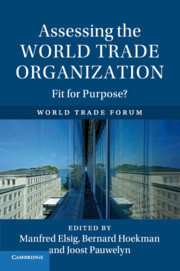Book contents
- Assessing the World Trade Organization: Fit for Purpose?
- Assessing the World Trade Organization
- Copyright page
- Contents
- Figures
- Tables
- Contributors
- Preface
- Abbreviations
- Part I Introduction and Setting the Stage
- Part II New Insight from the Early Times
- Part III General Trends and Patterns in WTO Dispute Settlement
- Part IV Zooming in on Specific Debates
- 9 Twenty Years of Third-Party Participation at the WTO
- 10 Mind the Gap
- 11 The Age of Innocence
- Part V Interactions Within and Across Regimes
- Index
- References
11 - The Age of Innocence
The Evolution of the Case Law of the WTO Dispute Settlement: Subsidies as a Case Study
from Part IV - Zooming in on Specific Debates
Published online by Cambridge University Press: 19 May 2017
- Assessing the World Trade Organization: Fit for Purpose?
- Assessing the World Trade Organization
- Copyright page
- Contents
- Figures
- Tables
- Contributors
- Preface
- Abbreviations
- Part I Introduction and Setting the Stage
- Part II New Insight from the Early Times
- Part III General Trends and Patterns in WTO Dispute Settlement
- Part IV Zooming in on Specific Debates
- 9 Twenty Years of Third-Party Participation at the WTO
- 10 Mind the Gap
- 11 The Age of Innocence
- Part V Interactions Within and Across Regimes
- Index
- References
- Type
- Chapter
- Information
- Assessing the World Trade OrganizationFit for Purpose?, pp. 276 - 318Publisher: Cambridge University PressPrint publication year: 2017



